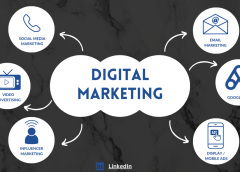In the vast landscape of digital marketing, one term holds significant weight: keywords. Understanding what keywords are and how they influence search engine optimization (SEO) is paramount for any marketer looking to enhance their online presence. In this article, we’ll delve into the essence of keywords, their importance in SEO, and the key areas where they can be strategically utilized to optimize website ranking.
What are Keywords in Digital Marketing?
Keywords are the foundation of online search. They are the specific words or phrases that users type into search engines when looking for information, products, or services. For instance, if someone is searching for “best digital marketing strategies,” then “best digital marketing strategies” becomes the keyword. In essence, keywords are the bridge that connects users with relevant content.
Importance of Keywords in SEO
Keywords play a pivotal role in SEO by helping search engines understand the content of web pages and match them with user queries. When a website incorporates relevant keywords strategically, it increases the likelihood of appearing in search engine results pages (SERPs) for those specific queries. Essentially, keywords serve as a compass for search engines, guiding them to relevant content that matches what users are searching for.
Key Areas for Keyword Optimization
- On-Page Content: One of the primary areas to optimize keywords is within on-page content. This includes website copy, blog posts, product descriptions, and other textual content. By naturally incorporating relevant keywords into these elements, marketers can improve their chances of ranking higher in search results.
- Meta Tags and Descriptions: Meta tags, such as title tags and meta descriptions, provide search engines with information about the content of a webpage. Including targeted keywords in these tags can enhance the page’s visibility and click-through rate in search results.
- URLs and Slugs: Optimizing URLs and slugs (the part of a URL that identifies a particular page) with relevant keywords can make it easier for both search engines and users to understand the content of a webpage. Short, descriptive URLs containing keywords tend to perform better in search results.
- Image Alt Text: Alt text, or alternative text, is used to describe images on a webpage. Incorporating relevant keywords into image alt text not only improves accessibility for visually impaired users but also provides search engines with additional context about the content of the page.
Understanding Google Ads
Google Ads, formerly known as Google AdWords, is Google’s advertising platform that allows businesses to create and display ads on Google’s search engine results pages (SERPs) and across its vast network of partner websites. It operates on a pay-per-click (PPC) model, where advertisers bid on keywords and pay for clicks on their ads.
Leveraging Long-Tail Keywords for Enhanced Visibility
In addition to targeting broad, high-volume keywords, marketers can also benefit from incorporating long-tail keywords into their SEO strategy. Long-tail keywords are more specific phrases that typically have lower search volumes but higher conversion rates. For example, while “digital marketing” may be a broad keyword, “best digital marketing strategies for small businesses” is a long-tail keyword that caters to a more specific audience.
By targeting long-tail keywords, marketers can attract highly relevant traffic to their websites, leading to higher engagement and conversion rates. These keywords often indicate that users are further along in the buying process and have clearer intentions, making them valuable targets for businesses.
Utilizing Keyword Research Tools for Insights
To identify the most effective keywords for their digital marketing campaigns, marketers can leverage a variety of keyword research tools. Platforms like Google Keyword Planner, SEMrush, and Ahrefs provide valuable insights into keyword search volume, competition level, and potential performance.
By conducting thorough keyword research, marketers can uncover untapped opportunities, identify emerging trends, and refine their content strategy to better align with user intent. Additionally, monitoring keyword performance over time allows marketers to adapt their strategies and stay ahead of evolving search trends.
Optimizing Content for Voice Search
With the rising popularity of voice-enabled devices like smart speakers and virtual assistants, optimizing content for voice search has become increasingly important. Voice search queries tend to be more conversational and longer in nature, making long-tail keywords particularly relevant.
Marketers can optimize their content for voice search by focusing on natural language patterns, answering common questions concisely, and structuring content in a format that is easy for voice assistants to parse. By aligning their SEO strategy with the growing prevalence of voice search, marketers can ensure that their content remains accessible and relevant to a broader audience.
Conclusion
In the ever-evolving realm of digital marketing, keywords remain a fundamental component of successful SEO strategies. By understanding the significance of keywords, optimizing them effectively across various areas of a website, and leveraging platforms like Google Ads, marketers can enhance their online visibility, attract targeted traffic, and ultimately achieve their business objectives in the digital landscape.





